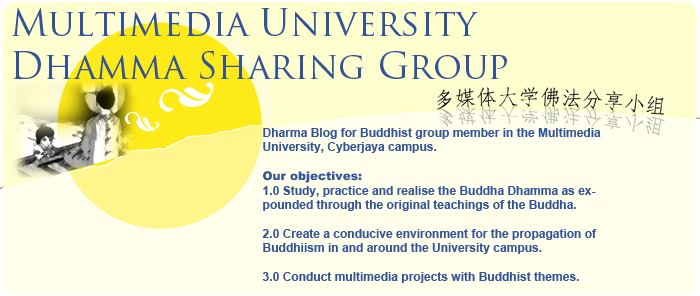
Treasuring the Free but Priceless Dharma
Nobody has patented rights to the Dharma in the sense that even the Buddha is still sharing the Dharma with countless beings for free elsewhere. The Dharma is priceless, yet it is given away free nowadays. (Unless of course, there is a nominal charge to cover costs.) Like many free things we get these days, they are usually taken for granted and thus undervalued.
If one is observant, one would notice that in our material consumer driven society, one finds fewer people enjoying a carefree Saturday afternoon in a free public park or meditating in an open temple, as compared with the majority crowding in the town centre's shopping malls. However, this situation is not unique to modern times. Throughout human history, the proportion of people practising their faith tends to dwindle in materially better times and booms in harder times - when the call for spirituality suddenly becomes urgent.
In the history of the Mahayana tradition, many Chinese monks braved the long journey to India to retrieve the Buddhist scriptures. Many Indian monks also did the same, travelling the opposite direction to China, so as to share the Buddha's teachings. It was recorded in Chinese history that only 1 in 10 who travelled to the west (to India) returned, the rest pressumed having perished along the difficult journey. Despite each expedition being life-endangering, what motivated the monks was the quest for the ultimate Dharma.
Cited in the sutras and widely believed, this might be the period of the decline of the Dharma. This means we should buck up, not give up in learning and practising the Dharma. Let's hold back the Dharma-ending age as long as we can. Ironically, when information and communication is more instananeously free-flowing than ever in recorded history, the fervour and thirst for Dharma understanding seems to pale - in comparison to the days of the journey to the west?
People tend to overpay to own pricey and relatively useless material things, as they take useful free gifts for granted. Until one had realised the absurdity of this, one will not see the importance of spiritual cultivation and living according to the Eightfold Path, Five Precepts and other aspects of the Buddha's teachings.
When asked if they had studied the sutras in depth, many lay-Buddhists often say they have "no time". Busy people tend to defer realising the truth, or seeking answers to their life's problems - until it is too late. If this situation prevails, we will indeed see the real "ending" of the Dharma. It would not mainly be due to demonic interference, but due to the general lack of diligence and faith of the majority in practising the Dharma. Thus, individual Buddhists should work steadfastly to understand the sutras, which would enable them to actualise the Dharma in their daily lives. However, note that experienced teachers might be needed to guide us to understanding the scriptures, lest we misinterpret them or do not understand.
As one comfortably reads the sutras surrounded by material comforts, one should never forget the hardship of those who had journeyed to the west. Practising and realising the Dharma in the sutras would be the best way to honour them. Now is always the best time to get motivated and practise the Dharma - this most priceless free gift to us all, from noneother than the Buddha Himself!



No comments:
Post a Comment